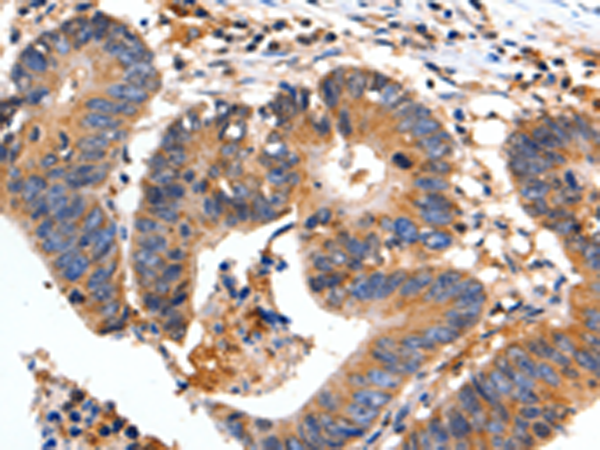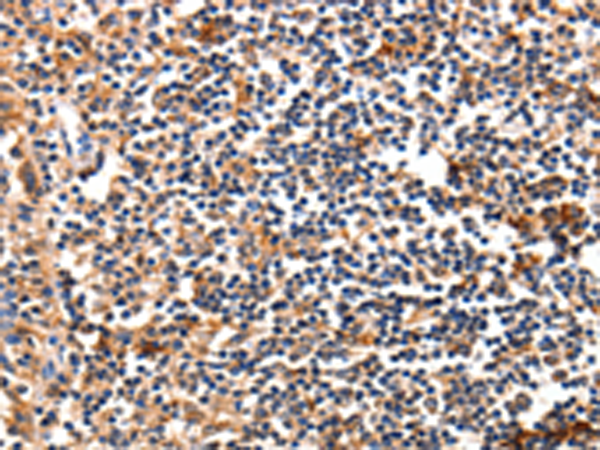


| WB | 咨询技术 | Human,Mouse,Rat |
| IF | 咨询技术 | Human,Mouse,Rat |
| IHC | 1/50-1/100 | Human,Mouse,Rat |
| ICC | 技术咨询 | Human,Mouse,Rat |
| FCM | 咨询技术 | Human,Mouse,Rat |
| Elisa | 1/2000-1/10000 | Human,Mouse,Rat |
| Aliases | GIG3, MORT1 |
| WB Predicted band size | 23 kDa |
| Host/Isotype | Rabbit IgG |
| Antibody Type | Primary antibody |
| Storage | Store at 4°C short term. Aliquot and store at -20°C long term. Avoid freeze/thaw cycles. |
| Species Reactivity | Human, Mouse |
| Immunogen | Fusion protein of human FADD |
| Formulation | Purified antibody in PBS with 0.05% sodium azide and 50% glycerol. |
+ +
以下是3-4条关于 **FADD抗体** 的参考文献及其摘要内容的简要概括:
---
1. **文献名称**:*FADD, a novel death domain-containing protein, interacts with the death domain of Fas and initiates apoptosis*
**作者**:Chinnaiyan AM, et al.
**摘要**:该研究首次克隆并鉴定了FADD(Fas-associated death domain protein),发现其通过死亡结构域(death domain)与Fas受体相互作用,在Fas介导的凋亡信号通路中起关键作用,为后续凋亡机制研究奠定基础。
---
2. **文献名称**:*Defective TNF-alpha-induced apoptosis in FADD-deficient mouse embryonic fibroblasts*
**作者**:Zhang J, Xu M.
**摘要**:通过构建FADD基因敲除小鼠胚胎成纤维细胞模型,发现FADD缺失导致TNF-α诱导的细胞凋亡受阻,证实FADD在死亡受体(如TNFR1)下游信号传导中的必要性。
---
3. **文献名称**:*Role of phosphorylated FADD in cancer progression*
**作者**:Park SJ, et al.
**摘要**:研究聚焦FADD的磷酸化修饰(如Ser194位点),发现其在多种癌症中异常表达,并通过调控NF-κB等信号通路促进肿瘤细胞存活,提示FADD抗体可用于癌症诊断或靶向治疗研究。
---
4. **文献名称**:*FADD is required for DR4- and DR5-mediated apoptosis in human T cells*
**作者**:Alappat EC, et al.
**摘要**:利用FADD特异性抗体阻断实验,证明FADD在TRAIL受体DR4/DR5介导的T细胞凋亡中不可或缺,为自身免疫性疾病和肿瘤免疫治疗提供理论依据。
---
以上文献涵盖了FADD在凋亡信号、疾病机制及抗体应用中的核心研究,可根据实验需求进一步查阅原文。
FADD (Fas-associated protein with death domain) is a pivotal adaptor protein in apoptosis signaling pathways. It contains a C-terminal death domain (DD) and an N-terminal death effector domain (DED), enabling interactions with death receptors like FAS, TNFRSF1A, and TRAIL receptors. Upon ligand binding, FADD recruits caspase-8/10 via DED interactions, forming the death-inducing signaling complex (DISC) to initiate extrinsic apoptosis. Dysregulation of FADD is linked to cancer, autoimmune disorders, and neurodegenerative diseases.
FADD antibodies are essential tools for detecting FADD expression, localization, and interactions in research. They are widely used in Western blotting, immunofluorescence, co-immunoprecipitation, and flow cytometry to study apoptotic mechanisms. Monoclonal antibodies offer high specificity, while polyclonal versions may detect isoforms. Aberrant FADD phosphorylation (e.g., Ser194) or altered expression levels are investigated as potential biomarkers. These antibodies also aid in exploring non-apoptotic roles of FADD, such as in cell cycle regulation and innate immunity. Commercial FADD antibodies are typically validated in common models (e.g., human, mouse, rat), with applications spanning basic research and drug discovery targeting apoptosis-related pathologies.
×